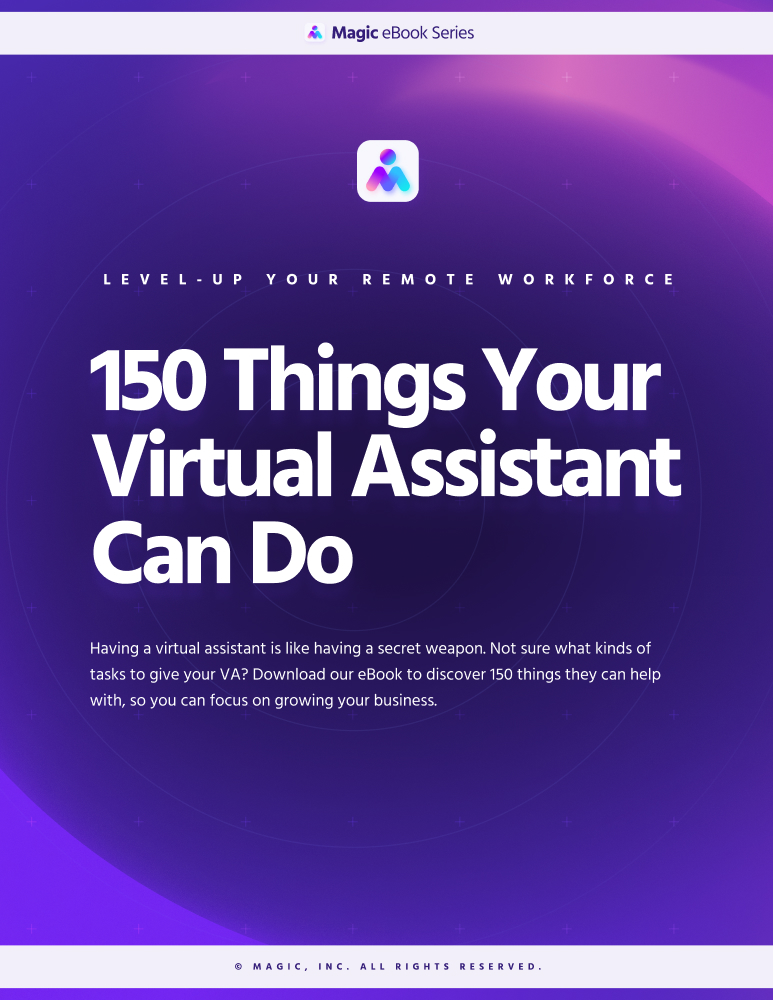Virtual assistants (VAs) are on the rise. VAs boast ease of hiring, flexible arrangements, and low rates free from the overhead costs of equipment, office space, and mandatory benefits. As remote work and virtual offices exploded in recent years, these advantages made them a mainstay among businesses of all sizes.
For all the problems VAs solve, though, many business owners still hesitate to enlist them for various reasons. “What is a virtual assistant, exactly?” they might ask, “Can they do what I need them to do? Where do I find one? How do I search?” And so on.
These are good questions to ask. VAs cover a broad range of work, and as remote working tools develop, that scope will only grow. There are different types of VAs, and multiple ways to search for and recruit one.
This article aims to equip you with the information you’ll need to make sense of the VA landscape and, more importantly, to get the kind of help your business needs.
- VAs provide flexible, affordable talent to handle tasks remotely. While most of the work they do is administrative, there are also VAs that work in more specialized niches.
- Delegating routine duties to VAs increases productivity and frees businesses to pursue innovation and growth.
- The global VA talent pool makes it easier to find the skills your business needs on demand. There are many ways to find reliable VAs, from job marketplaces to agencies and even professional referrals.
What’s a Virtual Assistant?
A VA is an independent contractor who supports a business through specific services carried out remotely. Most VAs handle administrative or clerical tasks, though some offer creative or technical services. This flexibility lets you find the right skills for your needs, regardless of location.
VAs free you up to concentrate on high-level responsibilities like strategic planning and growing your company. And with no office space or equipment needed, hiring a VA saves money while expanding what you can accomplish.
Whether it’s scheduling appointments, designing graphics, analyzing data, or assisting with special projects, virtual assistants make running a business more manageable and productive. Finding the right match in a VA provides invaluable support in a cost-effective way.
Skills and Qualifications
Virtual assistants can fill many possible roles, so VAs, as a whole, have a varied array of skills. Some are experienced with social media, bookkeeping, sales, or customer service. That said, they could take on functions like graphic design or research, as well.
The only skills required across the board are those pertaining to remote work. This means VAs need to know how to communicate effectively, and they need to be familiar with remote collaboration tools.
While there’s no education specific to VAs as a whole, they may benefit from backgrounds in business, communication, media, or technology (depending, of course, on the roles they apply for). That said, some agencies do offer training courses to prepare people for work as VAs.
Tools of the Trade
VAs use a suite of digital tools to get things done. Most of these are cloud-based, allowing them to easily share files and information they work on with their clients. Most will use a combination of a few tools with different purposes. These include:
- Productivity Tools: These digital tools help keep workers on the same page. They include time trackers, kanbans, and project management suites. Collaborative office suites, such as Microsoft 365 and Google Office, are also widely used.
- Messaging Platforms: Good communication is vital to a VA’s work. Many use virtual tools for instant messaging and voice/video calls, among others. Platforms such as Slack are quite popular for their flexibility: offering synchronous communication while providing solid message archival capabilities.
- Password Managers: Infosec is a major concern when working with remote contractors. Password managers combine convenience and protection.
These are just the basics. Remote specialists use a variety of virtual assistant tools geared to their fields of expertise. Fortunately, many of these are already optimized for remote collaboration!

Not sure what tasks to give your virtual assistant? In this eBook, we share 150 tasks they can do for you so you can save hours a day.
Learn MoreWhat Can Virtual Assistants Do?
Management wisdom holds that the best tasks to delegate are fairly simple (or teachable) and routine, with well-defined endpoints for turnover or approval. The staples of VA work have these characteristics. A lot of it is administrative, though they can perform more specialized work, too.
Email Management
A virtual assistant can take over your crowded inbox, providing dedicated email support by sorting messages, flagging the important stuff, and filtering out spam. With these critical tasks handled, your inbox stays organized and free from email overload.
Assistants also take on correspondence by answering routine questions and drafting professional responses. Some other email management tasks they can do are:
- Sort and clean messages in your various work email inboxes
- Organize your contacts into segmented email lists
- Drafting and scheduling follow-up emails
- Setting up auto-responders or drafting replies to customer queries
- Updating your calendar based on appointments arranged by email
- Sort and verify the email addresses of prospects
- Creating templates for email marketing and monitoring analytics
The right virtual assistant makes your email a productive tool rather than a constant distraction. With an assistant handling these distractions, you can focus on high-priority work while ensuring important information does not slip through the cracks.
Calendar Management
An adept virtual assistant can optimize calendars to help your team accomplish more with each hour of the workday. By coordinating schedules across the team, they maximize collaboration while minimizing disruptions.
With a virtual assistant conducting the scheduling orchestra behind the scenes, days feel energizing rather than chaotic. Team members make every minute count, accomplishing more together than alone. The result is greater productivity and momentum across the organization. And isn’t that what time is for?
Calendar management tasks include:
- Organizing to-dos into prioritized lists of tasks
- Scheduling meetings
- Sending reminders for appointments or deadlines
- Organizing scheduled bill payments
Travel Planning and Coordination
Planning business trips can be quite frustrating, so it’s no surprise that it’s often delegated. A VA can handle travel preparations, research flights, accommodations, and transportation options, and make reservations and itineraries as needed.
Dedicated VAs gradually adapt to your team’s constraints and preferences when traveling. This means that over time, travel planning becomes less stressful and more efficient. This takes the burden of planning and stress out of work trips.
Data Entry and Transcription
Data management work can be especially time-consuming. VAs can shoulder this work, so you get more time without sacrificing data accuracy.
Some of the most common data entry tasks delegated to VAs are:
- Entering data into spreadsheets or CRM systems
- Updating or purging entries with missing data
- Retrieving data and compiling reports
- Deleting outdated records
- Translating data from one format to another
Data entry VA services are especially popular among academic, medical, and legal businesses. They’re also widely used by businesses that keep extensive records, issue a lot of bills, or work with large volumes of mail.
Research
A virtual assistant can support data-driven business decisions by researching industry trends, customer preferences, and market demands. When considering new products or projects, for instance, your VA can compile detailed reports, analyzing opportunities and competition to save you time.
VAs skilled in data analysis can manually compile information to inform business operations, whether for internal use or to sell research commodities to clients. With the help of virtual assistants focused on research, you can foster an approach rooted in current market and performance data rather than assumptions.
Your assistants can also help you gather first-hand data. For example, they can:
- Distribute surveys or set them up on your website
- Organize focus group discussions
- Compile survey data
Other Types of Virtual Assistant
The term “virtual assistant” is often used as a catchall phrase for independent remote contractors. Sometimes, when people speak of VAs, they’re referring to assistants who offer more specialized services. Below are the types most often sought out.
Executive Assistant
Executive assistants provide high-level administrative support to business owners and leaders. Where VAs might fill a gap in a department or give a team a boost, EAs focus on providing an individual leader with all-around support. For high-level executives, getting a dedicated assistant to manage their priorities and tasks can be a game-changer.
Virtual EAs manage calendars, coordinate meetings, handle travel arrangements, and perform various other tasks. They ensure their client’s time is optimized for strategic decision-making.
Customer Service Assistant
Customer service remains one of the most widely outsourced services across industries. Virtual customer service assistants are popular hires thanks to the flexibility they provide and the ease with which they can be brought on.
Customer service assistants handle customer queries, resolve complaints, and provide exceptional customer support. They ensure customers receive timely and satisfactory responses, enhancing the overall customer experience.
Since they can be contracted part-time, off-hours, or on short notice, they make for great additions during seasonal surges or when rolling out new projects.
Sales Assistant
Sales virtual assistants can help in a few different ways.
First, they can provide backend support. This includes managing leads, conducting market research, and assisting with sales-related tasks. By taking care of the data- and paperwork behind the scenes, they can give your sales reps the focus and time they need to close bigger deals.
Another way they can help is by doing cold outreach or follow-ups. Sales VAs can do cold calls, send or schedule marketing emails, and follow-up on warm leads. All of these tasks are time-consuming but quite easily taught. If you have an in-house sales team, they’ll be free to focus on closing leads in the final stages of consideration.
Bookkeeping Assistant
As a meticulous, time-consuming job, bookkeeping is often outside of a business’s core expertise. So, bookkeeping VAs are a great option for small businesses or startups that may not need a full-time bookkeeper but could use better visibility into their finances.
Virtual bookkeeping assistants handle financial tasks such as invoicing, expense tracking, and basic accounting. They ensure accurate record-keeping and help businesses maintain financial stability.
Most bookkeeping VAs use cloud-based accounting software, which keeps financial records accessible while maintaining infosec standards. If you’re not using any yet, a bookkeeping assistant can get you started with it and can transfer data from your old records to the cloud.
Why Hire a Virtual Assistant
Hiring a virtual assistant provides flexibility, productivity, and global talent at an affordable price. With a talented VA handling crucial delegatable duties, companies seem larger in capacity and can take on more robust workloads.
Rather than committing to in-house hires that require office space, equipment, and benefit packages, you can easily source qualified specialists globally to meet your fluctuating business needs. This on-demand flexibility translates into increased productivity.
By delegating time-consuming administrative tasks or supplementary projects, VAs create room for leaders to drive true growth and innovation.
While an in-house team limits you to specific skill sets, the expansive VA talent pool means you’ll locate the precise specialization your business requires. With the right virtual support behind you, what once seemed out of reach becomes readily attainable.
Common Concerns about VAs
Working with VAs isn’t without troubles—but forewarned is forearmed. If you know how to prepare, you can avoid these issues when working with your own remote assistants.
Communication Challenges
The prospect of communication problems is one of the most common VA-related misgivings. Aside from concerns over language barriers (which can easily be sorted out through basic screening), there are the challenges inherent in remote collaboration.
Settling on a few things early on can drastically reduce communication issues, though.
- Have well-defined channels for communication
- You can separate channels for urgent communication and archives for future reference
- Specify when VAs should send regular updates
- Designate a point person on your end
- Follow best practices for remote team communication
Misconceptions about Accountability
Another common worry is that VAs will shirk their duties or deliver low-quality output. This goes hand in hand with broader concerns over how to supervise remote workers.
One fairly common reason for problems in this regard is having poorly defined objectives at the onset. This doesn’t just refer to goals or what you’d want to get out of your VAs. It also entails having criteria or KPIs that properly measure success.
As for supervising VAs, it’s a little different from working with other remote employees. As long as you set up a conducive remote work environment and maintain proper project management standards, everything should go smoothly.
Trust and Security Issues
Working with VAs can also lead to worries over security and confidentiality.
Usually, you can sort this out by looking at a VA’s (or agency’s) track record. Look for past clients, testimonials, and other social proof they can offer. (If they’re new to the role, you may have to rely on interviewing them.)
Otherwise, just maintain infosec best practices, and your data should remain safe. Use password managers, keep sensitive information apart from more general files, and password-protect your most important files.
How to Find a Virtual Assistant
As with other part-time or remote hires, there are a few different avenues you can explore to recruit VAs.
Freelance Platforms
Online freelance sites (e.g., Upwork, Freelancer) connect clients with the talent to handle administrative, creative, analytical, and technical tasks virtually. Most VAs will have a general resume, while specialists may also have portfolios or sample works.
Some of these platforms also have integrated communication channels, which makes it easy to vet potential assistants. With streamlined hiring and extensive global talent access, these platforms provide an efficient way to identify customized virtual support that aligns with your business needs and budget.
Networking and Referrals
These remain perhaps the most reliable way to find top-tier assistants. Ask around in your professional circle, and you might be surprised to find that some of your peers have had VAs working behind the scenes for quite some time.
With online platforms already saturated, many VAs and agencies also rely on networking and referrals to get new clients. (And who knows, a good word from a client they enjoy working with may get you favorable terms with a VA or agency.)
VA Agencies and Firms
It’s quite common for VAs to work under an agency or firm. In these cases, while VA may work for you directly (and even exclusively), the agency streamlines the paperwork from recruitment to billing.
Going through an agency is especially helpful if you’re recruiting multiple assistants. Many agencies offer account-wide support or managed services, which can help you stay on top of multiple hires at once.
Get the Best Virtual Assistants with Magic
A well-placed VA can dramatically improve a team’s or a business’s performance. Indeed, VA hiring has increased significantly over the past few years, with more businesses tapping into their potential.
Magic can help you get started with your own VA hiring, whether you need just one assistant or several. Let us know what sort of work you’re looking to delegate to a VA, and we’ll find the ideal worker for you.
Getting started with Magic is quick and straightforward, with no long-term contracts. If you want to start boosting your team’s output, get in touch with us today!







